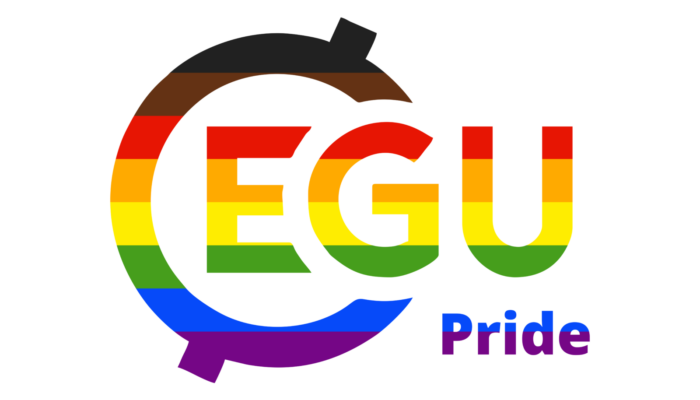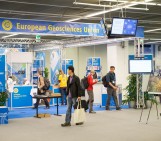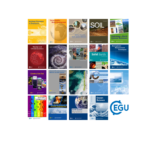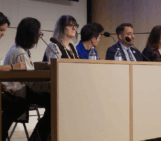
The Equality, Diversity, and Inclusion (EDI) Committee at the European Geosciences Union (EGU) is dedicated to promoting a vision of equality, diversity, and inclusion through an integrated, coordinated, and constructive approach. Their mission includes raising awareness of EDI values within the scientific community, organizing sessions and meetings focused on EDI issues, representing EGU in relevant initiatives, and providing constructive suggestions to the EGU Council to foster a more inclusive geoscience community.
This blog post highlights the EDI Committee’s accomplishments and emphasizes the importance of pride and progress in creating a more inclusive scientific community.
Townhall Meetings and Splinter Sessions
One of the EDI Committee’s key achievements was organizing a townhall meeting titled “Common Grounds between the Global South and North.” This meeting facilitated meaningful discussions on bridging the gap between geoscientists from different regions to promote a more inclusive and collaborative global geosciences community.
The Splinter sessions such as the “Community Discussion of Issues Facing Colleagues from the Global South” and “LGBTQIA+ in Geosciences” provided platforms for under-represented groups to voice their concerns and share their experiences.
These sessions highlighted the unique challenges faced by geoscientists from the Global South and the LGBTQIA+ community. The aim was to develop greater understanding and awareness of their intersecting issues. By creating these spaces for dialogue, the EDI Committee has taken significant steps toward promoting inclusivity and equity within the geosciences.
Union Symposia: On Accessibility, Representation, and Inclusion
The EDI Committee has also organized several Union Symposia to address critical issues related to accessibility, representation, and inclusion. Notable examples include:
US3: Challenges and solutions to increasing accessibility, representation, recognition, and diversity of European countries in the European geosciences community – This symposium focused on identifying and addressing barriers to participation and recognition for geoscientists from diverse backgrounds.
US4: Juggling parenting and caring responsibilities with a career in the geosciences: barriers and opportunities to increasing accessibility and inclusion – This session explored the challenges faced by geoscientists with caregiving responsibilities, highlighting the need for more supportive and flexible work environments.
US5: Allyship and supporting others for a more diverse and inclusive geosciences: This symposium emphasized the importance of allyship and provided practical strategies for supporting under-represented groups within the geosciences community.
Great Debates: A marginalized voices amplification initiative
The EDI Committee has also facilitated important discussions through Great Debates, such as:
GDB4: Scientific Neocolonialism: tools and mechanisms to advocate and amplify the voices, knowledge, and recognition of local knowledge in geoscience research – This debate addressed the issue of scientific neocolonialism and called for the need for more inclusive and equitable research practices that recognize and respect local knowledge.
GDB10: Elevating EDI practices in the geosciences considering intersectionality – This session focused on the importance of considering intersectionality in EDI efforts, highlighting the complex and interconnected nature of different forms of discrimination and marginalization.
These debates have provided valuable insights and strategies for promoting equity and inclusion within the geosciences, helping to amplify marginalized voices and create a more diverse and inclusive community.
Short Courses:
The EDI Committee has also organized a series of short courses to raise awareness and educate the geosciences community on important EDI issues. Examples include:
SC1.3: The LGBT Pride group at EGU: Current progress, challenges for LGBT people in the Earth system sciences, and ideas for how to overcome them – This course addressed the challenges faced by LGBTQIA+ geoscientists and provided strategies for creating a more inclusive environment.
SC3.11: Neo-Colonialism in geosciences: what is it and why should you care? – This session educated participants on the concept of neocolonialism in geosciences, highlighting the importance of ethical and inclusive research practices.
On Safety and Inclusivity in the Workplace:
In addition to promoting dialogue and education, the EDI Committee has implemented several initiatives to improve workplace safety and inclusivity. These include:
Virtual Bystander Intervention Workshop – Held on October 5, 2023, this workshop increased participants’ skills and confidence in responding to harassment and bullying in the workplace. The success of this virtual event led to the organization of a follow-up short course at the EGU General Assembly, titled “How to become an active bystander to improve workplace climate.”
Workplace Safety Survey – The EDI Committee conducted a focused survey to assess workplace safety in terms of harassment and inappropriate behavior. The results of this survey will inform future initiatives to create safer and more inclusive work environments.
Promoting EDI and Raising Awareness
The EDI Committee has also made significant efforts to promote EDI and raise awareness within the geosciences community through various initiatives:
Statement on Scientific Neocolonialism for Earth Day – Published on March 22, 2023, this statement recognized the potential for European-based researchers to unfairly benefit from studies or fieldwork performed in other parts of the world, with little to no involvement or credit given to local researchers. The statement called for high-quality science to be supported by inclusive and transparent research practices.
Implementation of Name Changes in EGU Journals – This initiative allows individuals to change their names in EGU journals, promoting inclusivity and respecting individuals’ identities.
Future Goals and Initiatives:
The EDI Committee remains committed to continuing the discussion on the under-representation of European and extra-European countries in key EGU initiatives. They will also focus on promoting inclusivity in scientific conferences and publishing journals, and raising awareness about the importance of diversity within the EGU structure.
What You Can Do to Support EDI Initiatives:
Everyone in the geosciences community can play a role in supporting EDI initiatives. Here are some ways you can contribute:
- Nominate deserving individuals for the EDI Award and other EGU Union or Division Medals – By doing so, you can help improve the diversity of nominees and recognize the contributions of under-represented groups.
- Submit an abstract to the 2025 EGU General Assembly session “EOS3.1 – Promoting and supporting equality, diversity, and inclusion in the geosciences” – This session is an opportunity to share your work and ideas on promoting EDI within the geosciences.
- Submit a scientific session to improve the diversity of the panel of conveners – Diverse panels bring a variety of perspectives and ideas, enriching the scientific discourse.
- Stay updated with the EDI Committee’s initiatives – Sign up for their mailing list and follow them on social media platforms like Twitter/X to stay informed about their latest activities and opportunities to get involved.
- Share your ideas and experiences – Inclusivity and safety within the EGU organization depend on the contributions of every individual. Your insights and feedback can help shape future EDI initiatives and create a more inclusive geosciences community.



